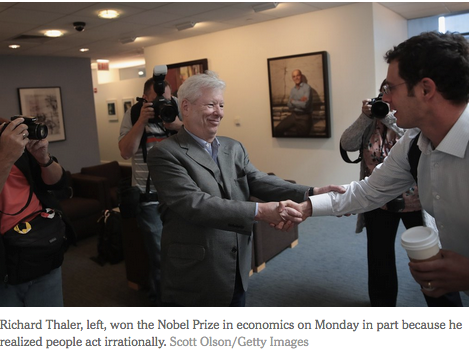Richard Thaler has just won an extremely well deserved Nobel Prize in economics. Thaler took an obvious point, that people don’t always behave rationally, and showed the ways we are systematically irrational.
Thanks to his work and others’, we know a lot more about the biases and anomalies that distort our perception and thinking, like the endowment effect (once you own something you value it more than before you owned it), mental accounting (you think about a dollar in your pocket differently than you think about a dollar in the bank) and all the rest.
Before Thaler, economists figured it was good enough to proceed as if people are rational, utility-maximizing creatures. Now, thanks to the behavioral economics revolution he started, most understand that’s not good enough.
But Thaler et al. were only scratching the surface of our irrationality. Most behavioral economists study individual thinking. They do much of their research in labs where subjects don’t intimately know the people around them.
It’s when we get to the social world that things really get gnarly. A lot of our thinking is for bonding, not truth-seeking, so most of us are quite willing to think or say anything that will help us be liked by our group. We’re quite willing to disparage anyone when, as Marilynne Robinson once put it, “the reward is the pleasure of sharing an attitude one knows is socially approved.” And when we don’t really know a subject well enough, in T. S. Eliot’s words, “we tend always to substitute emotions for thoughts,” and go with whatever idea makes us feel popular.




